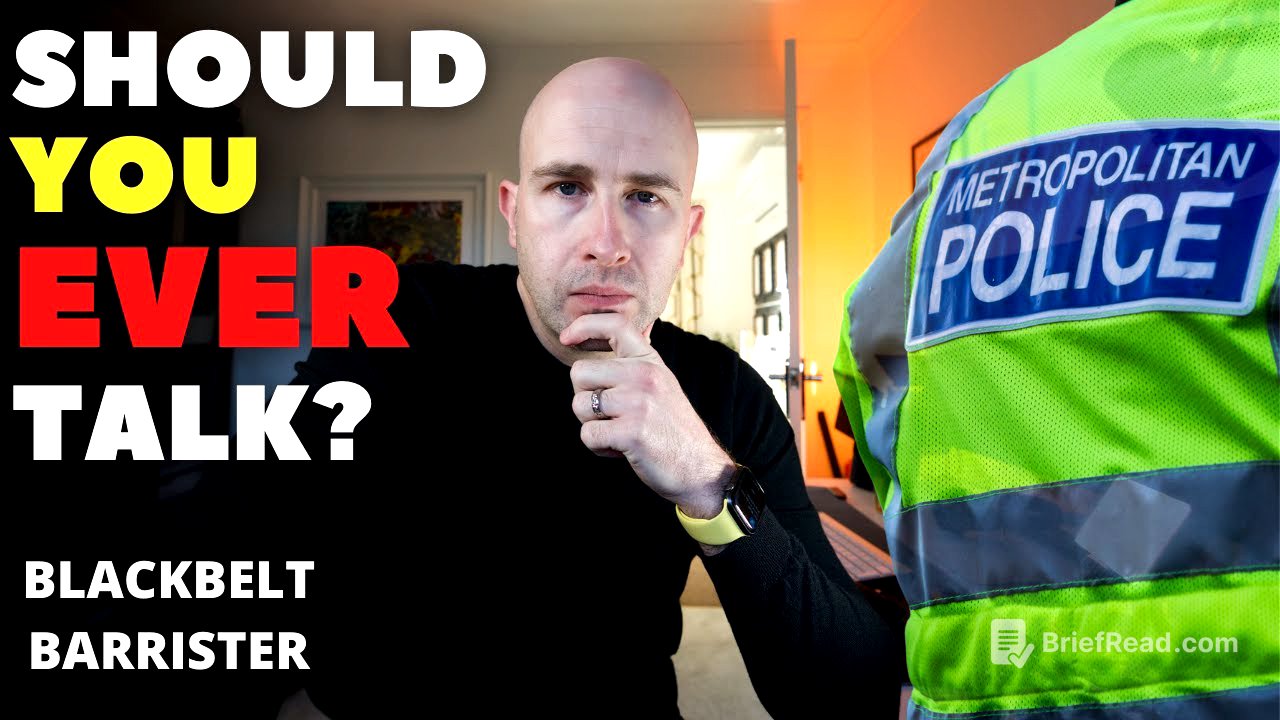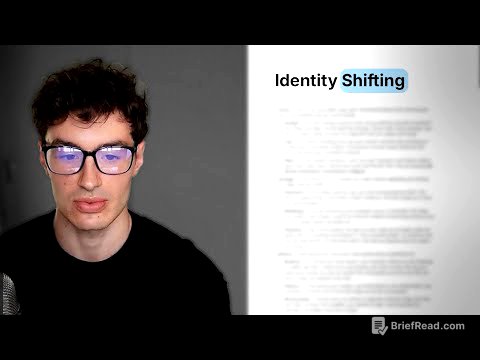TLDR;
This video explores the complexities of speaking to the police, presenting arguments for and against it. It highlights the risks of inadvertently providing incriminating information, even when innocent, and the potential for later inconsistencies to damage your defence in court. The video also explains the importance of seeking legal advice when questioned by the police.
- Police are trained to investigate and gather evidence, and any statement can be used against you.
- Saying the "wrong thing" can inadvertently establish elements of an offence.
- Remaining silent can harm your defence if you later rely on information not previously disclosed.
Introduction: Reasons to Talk or Not to Talk to the Police [0:00]
The video introduces the dilemma of whether or not to speak to the police, even when you believe you're innocent. As a barrister, the presenter aims to provide a balanced view, outlining reasons why it might be both beneficial and detrimental to speak to the police. The presenter draws an analogy to a trial, where both the prosecution and defence present convincing arguments, leaving the jury to decide. The goal isn't to definitively answer the question, but to provide a framework for making an informed decision.
Why You Might Not Want to Speak to the Police [2:00]
One of the main reasons to avoid speaking to the police is that they are trained to investigate crimes and gather evidence. When they speak to you, they are looking for evidence related to a suspected offence. The police know the specifics of the offence they are investigating, while you may not. This imbalance can lead you to inadvertently provide information that supports their case.
Theft Example: Saying the Wrong Thing [3:44]
The video uses the example of theft to illustrate how easily you can say the wrong thing. Theft has five elements: dishonest appropriation of property belonging to another with the intention of permanently depriving that person of it. Even in a seemingly innocent situation, such as borrowing an item from a friend, a falling out could lead to a theft accusation. If you admit to having the item, you've already proven the appropriation element. Subsequent statements, influenced by the pressure of questioning, could inadvertently establish the intention to permanently deprive, even if that wasn't your original intent.
The Risk of a Twisted Interview [8:03]
Police are trained to press for details and can make you feel guilty, potentially leading you to say things you don't mean. These statements can be used against you, twisting your words to fit the narrative of the offence. It's easy to say something that, in hindsight, you regret, especially when under pressure. It might be better to remain silent and present your defence in court, where you feel more confident and credible.
The Caveat: Harm to Your Defence [11:41]
The police caution states that it may harm your defence if you fail to mention something when questioned that you later rely on in court. If you give a different account in court than you did in your police interview, you risk appearing inconsistent and losing credibility with the jury.
Why You Might Want to Speak to the Police [12:35]
To convince you that it could be a good idea to talk to the police, the video explains that if you have a genuine defence, remaining silent can be detrimental. Using the same theft example, if you have evidence supporting your intention to return the item, failing to mention this to the police allows the prosecutor to argue that you fabricated the story for court.
Cross-Examination and Inconsistencies [14:10]
The prosecutor can highlight inconsistencies between your testimony and your previous silence, suggesting that you're lying. Even if you made a defence statement, omitting key details allows the prosecutor to undermine your credibility. The longer the time between the initial questioning and the trial, the more damaging this inconsistency becomes.
Self-Defence Example [17:54]
The video uses self-defence as another example. If you acted in self-defence but were mistaken about the threat (e.g., believing an umbrella was a stick), remaining silent to avoid embarrassment can backfire. The jury might not believe your self-defence claim if it's the first time they're hearing it in court.
Two Sides to the Coin [19:20]
The video reiterates the two sides of the argument: speaking to the police carries the risk of saying the wrong thing, while remaining silent can harm your defence if you later rely on unmentioned information. The key is to weigh these risks carefully.
Closing Advice: Seek Legal Advice [20:38]
The video concludes by emphasising the importance of seeking legal advice if you are ever questioned by the police, even if you believe you've done nothing wrong. The only exception is if you have irrefutable proof of your innocence, such as an alibi supported by GPS data. The presenter shares a story from their early legal experience, highlighting the multiple perspectives in any given situation.









